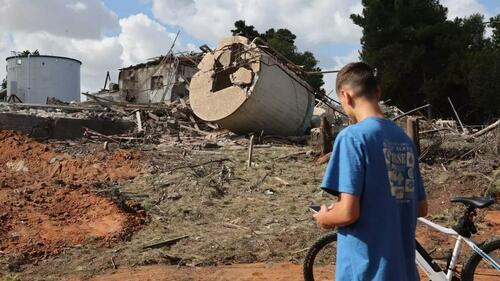Israel Censors Reporting On Military Sites Hit By Iran, Obscuring Extent Of Damage
After Iran launched waves of ballistic missiles across Israel on Tuesday evening, with video footage showing many of them hitting their targets, Israel closed off several military zones and barred the publication of reporting on where missiles hit the ground.
The censorship from Israel made it difficult to assess the full damage from Iran’s strikes, with both the US and Israel sending mixed messages regarding the size and impact of Tehran’s attack.
The Wall Street Journal reported on Wednesday that an initial Israeli assessment of the attack showed minor damage to military bases. The Iranian attack hit the Nevatim air base in the Negev Desert, where Israel has placed some F-35 fighter jets. But Israel’s military declined to share with the Journal the extent of the damage to the air base.
The military said “it didn’t want to give information to Iran” that could help Tehran understand how much damage its attack caused.
Several missiles were also located near the Dead Sea, near where Israeli nuclear facilities are located. It wasn’t clear whether they were intercepted by Israel or the US, according to the report.
One missile hit in the vicinity of a school in the town of Gedera, with photos of the aftermath showing a massive crater in the ground and major structural damage to the nearby buildings.
Israel said that its military and a coalition of allies including the US and UK intercepted most of the missiles. However, video footage online showed numerous missiles landing inside Israel and exploding without being intercepted by Israel’s Iron Dome missile defense system.
The attacks caused two injuries inside Israel, while one Palestinian was killed by shrapnel in the city of Jericho in the occupied West Bank.
⚡️ 🚨 Scenes of #Iranian Fateh missiles falling on the Tel Nof air base south of Rehovot pic.twitter.com/RDq9A1B9KF
— Middle East Observer (@ME_Observer_) October 1, 2024
US national security advisor Jake Sullivan said during a brief moment with reporters on Tuesday that the Iranian attack was both a significant escalation by Tehran and also “ineffective”.
“In short, based on what we know at this point, this attack appears to have been defeated and ineffective. The word ‘fog of war’ was invented for a situation like this. This is a fluid situation,” he said.
Meanwhile, Iran’s Islamic Revolutionary Guard Corps said in a statement broadcast on state television that 90 percent of the missiles it launched hit their targets successfully.
Iran said it launched the attacks in response to Israel’s killing of Hamas leader Ismail Haniyeh, as well as its more recent killing of Hezbollah leader Hassan Nasrallah and IRGC commander Abbas Nilforoushan in southern Beirut.
Israel’s censorship of Iran’s attack is not new, and the Israeli government has ramped up its censorship during its ongoing war on Gaza, which began in October 2023 after the Hamas-led attacks on southern Israel.
A report by +972 Magazine found that in 2023, the Israeli military barred 613 articles from being published by media outlets in Israel. That number was a record for the magazine, which began tracking censorship in 2011.
The magazine also found that an additional 2,703 articles had been redacted, which is the highest number of redactions since 2014, a year Israel also launched a war on Gaza.
Tyler Durden
Thu, 10/03/2024 – 02:45

